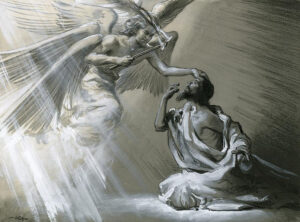Fr Neil writes on the lessons for the Fifth Sunday after Epiphany, 6 February 2022
And I said: “Woe is me! For I am lost; for I am a man of unclean lips, and I dwell in the midst of a people of unclean lips; for my eyes have seen the King, the Lord of hosts!”¹
The vision of the glory of God that Isaiah sees in the temple reveals to the prophet the reality of his and his people’s unworthiness to be in the presence of the Holy One of Israel.
Isaiah’s reaction is mirrored by Peter’s encounter with Christ in the Gospel reading². Peter became aware that he was in the presence of holiness. Peter’s reaction, like Isaiah’s, is both natural and understandable. “Depart from me, for I am a sinful man, O Lord.”
Yet it seems that the main qualification for the vocation that God would set before them was indeed their awareness of their inability to stand in the presence of God, trusting in their own righteousness.
If we see a none-too-pretty place we might say that it would look better if the lights were dimmed and our eyes half-closed. In the full bright light and with our eyes wide open, all the faults and imperfections are clear to see.
If we stand in the shadows then much can be hid from the eyes of others. Peter and Isaiah both stood in the radiant brightness of God’s glory and could not avoid becoming aware of their every imperfection. The same could be said of Paul, the author of our second lesson³, who was blind to his faults and thought himself righteous until he met the radiant brightness of Christ on the Damascus Road.
Isaiah is called to the office of prophet and in his response, “Here am I! Send me,”⁴ opens the way for him to become one of the greatest prophets of the Old Testament. Peter, a fisherman from Galilee, would become the ‘rock’ upon which Christ would build his Church; and Paul, the persecutor of the Church, would become its greatest missionary and evangelist.
These are three of the most unlikely characters that you’d expect to be called by God. But when you think about it, the Church is about the only organisation that exists where the credentials which you need to belong are that you are unworthy to belong. If someone believes himself to be worthy of God’s call then that person has already graduated and has no need of the Church — he can leave, for there is nothing that the Church can offer him. Only those who are aware of their emptiness can God fill with his graces for works of holiness and like Paul state, ‘though it is not I, but the grace of God which is with me.’⁵
How often have we held back from offering ourselves for any ministry within the Church because we have felt unworthy, not recognising that that is the first and correct attitude for those who are ministers of the Gospel? How many individuals have felt that they couldn’t welcome, read, visit the sick, serve tea and coffee, organise mission funds, serve on the pastoral council, be a foundation governor of a school, invite a neighbour to church, be a catechist, an evangelist or missionary, monk, nun, priest or deacon?
As I look upon the sanctuary I am acutely aware that I am not worthy of my calling, and in so many ways am the last person you might have expected to receive that calling. Yet here, by the grace of God, I stand. Every baptised person is called to a vocation as a living witness to the grace of God at work in the Gospel.
The sacraments are the place where Christ waits to encounter us. In the confessional he hears our confession, “I am a sinful man,” that he might touch our lips so that “your guilt is taken away, and your sins forgiven,” thereby being prepared to hear the words of Christ, “Do not be afraid, henceforth you will be catching men.”⁶
In mass, God’s Word comes to us as it did to Peter, Paul and Isaiah — as a personal call to leave everything and follow him. We must surrender our weaknesses in order to be filled with his strength — Christ’s body, soul and divinity. We receive this gift so that we might pass on to others the Gospel that we had delivered to us.
It is worth noting that this Gospel which Paul talks about has a specific and objective nature that isn’t dependent on Paul. In other words, it is not Paul’s gospel but the one that he received, from Christ, and has in turn passed on. This is the tradition in which Paul stands: that Christ died for our sins, that he was buried, that he was raised on the third day in accordance with the scriptures. This summary — what is already the development of the credal formula — is the objective nature of the gospel message. This is the message and tradition that we are called into and have to pass on to others.
The Gospel isn’t something we change to fit around our lifestyle and needs, but something to which we are called to conform our lives. We are to spiritually die with Christ, be buried with Christ, that we might rise with Christ to eternal glory.
We are to embody the gospel of Christ in the manner in which we live our lives and thus reveal the way to life for those who are lost in darkness and the shadow of death. The Gospel informs our everyday decision making, prayer and actions.
“I am a man of unclean lips, and I dwell in the midst of a people of unclean lips.” Yet, Lord, “Here am I! Send me.”
¹ Isaiah 6:5
² Luke 5:1–11
³ 1 Corinthians 15:1–11
⁴ Isaiah 6:8
⁵ 1 Corinthians 15:10
⁶ Luke 5:10









 Posts
Posts